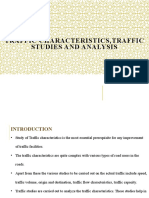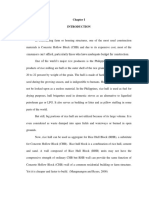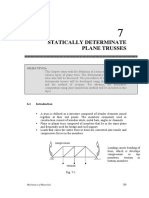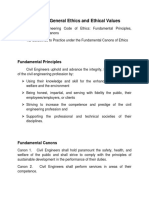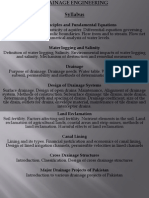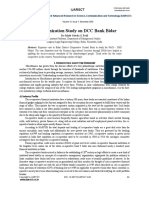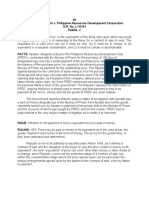Engineers and Globalization
Engineers and Globalization
Uploaded by
kalpanaCopyright:
Available Formats
Engineers and Globalization
Engineers and Globalization
Uploaded by
kalpanaOriginal Description:
Copyright
Available Formats
Share this document
Did you find this document useful?
Is this content inappropriate?
Copyright:
Available Formats
Engineers and Globalization
Engineers and Globalization
Uploaded by
kalpanaCopyright:
Available Formats
oneEngineers and Globalization
What is Globalization?
Globalization is a term that is used to describe the increasing trend towards
internationally integrated markets and global interconnectedness, making national boundaries less
important in terms of political, cultural, technological, financial, environmental, and national security
issues. It can have a positive effect on society, providing tremendous
opportunities and benefits - increased access to world markets, greater competition and
the freer flow of goods, services, capital and knowledge. However, globalization
may also lead to serious negative impacts on society, especially in developing nations where
increased poverty and the lack of access to clean drinking water, education,
good health and other basic services of life have increased with globalization. The impacts of
globalization have been felt all over the world and in all aspects of social life from the food we eat and
the TV we watch, to the sustainability of our environment.
Globalization of the Civil Engineering Profession
The effect of globalization on the civil engineering profession and the increasing expansion of
engineering services into international markets present both incredible opportunity and significant
challenges for the future of civil engineering. As the world becomes more globalized and as world
population increases, civil engineers will play a
critical role in addressing the concerns of the global community such as decaying infrastructure and
deterioration of the environment. However, due to increased access to
international markets, engineering will change considerably as issues that control the international trade
of professional services - international licensing requirements,
international codes and standards, and international treaties and trade agreements affecting engineers are
created and finalized. In addition, civil engineers must consider how
international policies regarding intellectual property rights, emerging markets for engineering products
and services, and other factors affect the practice of engineering and the
education of future engineers.
The purpose of this report is to provide a brief discussion of the effects of globalization on the civil
engineering profession in terms of future market growth, international trade agreements affecting
engineers and the education and training of future civil engineers. Although globalization will lead to
greater opportunities and access to world markets, there are several challenges facing the globalization of
the engineering profession. These challenges include developing international licensing procedures and
international engineering standards, defining global engineering ethics and the engineers responsibility to
society, and breaking language and cultural barriers. With increased globalization, the role of the
professional civil engineer will change significantly. It is important for the civil engineering community
to recognize its role in developing and negotiating international trade agreements
involving engineering services as well as preparing the future generation of civil engineers to meet the
challenges of a globalized world.
Challenges of engineers in globalization.
In the area of engineering for economic sustainability, the challenges are to design
technologies and systems that can facilitate global commerce, foster technological
innovations and entrepreneurship, and help generate jobs, while minimizing
environmental impacts and using resources efficiently. An emerging challenge to
engineering is also to develop technological approaches that can help prevent or mitigate
hostile acts, reduce the impact of natural disasters, and motivate humans to reduce their
draw on the resources of the planet.
The uneven distribution of water across continents and regions and its limited availability
make enormous demands on engineering skills, from devising more effective systems for
water and wastewater treatment and for recycling, to desalination, reducing evaporation
losses in reservoirs, stanching the large amount of leakage from old distribution systems
and building new recirculation systems.
in energy, engineering is challenged to continue to improve technologies for the collection,
in all its manifestations, of the inexhaustible but widely dispersed solar energy, for the
extraction of oil, for tapping thermal energy from the interior of the
Earth, and for providing environmentally sustainable power and light to large segments of
the worlds population. Integration into power grids of large amounts of intermittent solar
and wind power is a major challenge, and so is the devising of economical storage
mechanisms large and small that would have widespread utility, including also the
reduction of power plant capacities required to supply power at peak hours.
Improvement in efficiency of energy utilization to reduce the large percentage (about 50 per
cent) of global energy supply wasted is a global engineering challenge of the first
magnitude, and so is the decarbonization of emissions from fossil fuel power plants, e.g.
through underground gasification and deep coal deposits. The need to replace liquid
hydrocarbons, which power much of the worlds transportation systems, is particularly
urgent, and the prospect of doing so by biomolecule engineering of plant microbes or by
hydrogen fuel cells is emerging as a more desirable possibility than making biofuels from
agricultural biomass.
You might also like
- Assignment 2Document21 pagesAssignment 2Ibrahem Hani AlkhazalehNo ratings yet
- Manufacturing Business PlanDocument21 pagesManufacturing Business PlanWendimagen Meshesha Fanta100% (2)
- Repair Order InvoiceDocument4 pagesRepair Order InvoiceMohd EzrulNo ratings yet
- SA Group Project PDFDocument35 pagesSA Group Project PDFalnzNo ratings yet
- SECTION 2.5:: Special Services For Construction ProjectsDocument7 pagesSECTION 2.5:: Special Services For Construction ProjectsHeart DaclitanNo ratings yet
- Axially Loaded MembersDocument59 pagesAxially Loaded MembersAshok Dargar67% (3)
- Prelim Exam of Route Surveying QuestionnaireDocument1 pagePrelim Exam of Route Surveying QuestionnaireAnniesonNo ratings yet
- FloatmethodDocument2 pagesFloatmethodsiay mekonnenNo ratings yet
- Traffic Characteristics, Traffic Studies and AnalysisDocument40 pagesTraffic Characteristics, Traffic Studies and AnalysisPunith B KotagiNo ratings yet
- The Highway and Its DevelopmentDocument13 pagesThe Highway and Its DevelopmentJea Escabal MosenabreNo ratings yet
- Traffic Congestion: Transportation System Issues and ChallengesDocument6 pagesTraffic Congestion: Transportation System Issues and ChallengesMatt Julius CorpuzNo ratings yet
- CE103-1 - 3. Design Criteria For Highways (DPWH DGCS)Document47 pagesCE103-1 - 3. Design Criteria For Highways (DPWH DGCS)isidro ylananNo ratings yet
- The Impact of Globalization On The SocietyDocument2 pagesThe Impact of Globalization On The Societydawood2600No ratings yet
- Product Idea and Building A TeamDocument15 pagesProduct Idea and Building A TeamChristine Mae TinapayNo ratings yet
- Hydrology: Precipitation: Occurrence and MeasurementDocument41 pagesHydrology: Precipitation: Occurrence and MeasurementMaryann Requina AnfoxNo ratings yet
- Ce353 CH5 PDFDocument23 pagesCe353 CH5 PDFDarlene Mae ZaraNo ratings yet
- Proposed Design For A Four-Storey Building From A Two-Storey Building of Public School in Mandaue CityDocument42 pagesProposed Design For A Four-Storey Building From A Two-Storey Building of Public School in Mandaue CityRitchmon GonzalesNo ratings yet
- CE142P-2 / E01 Engr. Edward Monjardin 01-09-21 01-12-21: Jingona, Fatimah Rahima TDocument6 pagesCE142P-2 / E01 Engr. Edward Monjardin 01-09-21 01-12-21: Jingona, Fatimah Rahima TFatimah Rahima Jingona100% (1)
- CE5520 PLATE NO. 7 (To Be Submitted On May 20, 2020)Document2 pagesCE5520 PLATE NO. 7 (To Be Submitted On May 20, 2020)Peter Adrian NgoNo ratings yet
- 4 VehicleDocument9 pages4 VehicleMohannad S ZebariNo ratings yet
- Chapter 1: The Highway and Its Development 1-1. Brief History of RoadsDocument14 pagesChapter 1: The Highway and Its Development 1-1. Brief History of RoadsFaith AndrionNo ratings yet
- Civil Engineering, Sustainability, and The FutureDocument34 pagesCivil Engineering, Sustainability, and The Futurei can eat a pack of chips without making a soundNo ratings yet
- Case StudyaplDocument14 pagesCase StudyaplElmer OgalescoNo ratings yet
- Prefi Calculus DraftDocument2 pagesPrefi Calculus Draftralph crucilloNo ratings yet
- FINAL Hydraulics ThesisDocument66 pagesFINAL Hydraulics ThesisCristhel Mhae BantoyNo ratings yet
- CE Thesis Format (Based On RDCO Format)Document19 pagesCE Thesis Format (Based On RDCO Format)Jason Kent V. MecaresNo ratings yet
- Sub - Disciplines of Civil EngineeringDocument11 pagesSub - Disciplines of Civil EngineeringAirah Nicole CampilanNo ratings yet
- Em Lecture 1Document7 pagesEm Lecture 1hiba7hNo ratings yet
- Module 1Document26 pagesModule 1Afroz AhamedNo ratings yet
- Thesis ContentDocument39 pagesThesis ContentSunshine Dangkeo50% (2)
- Engineering Economy NotesDocument4 pagesEngineering Economy Notesadamong99No ratings yet
- Session 4: Hydraulic ConductivityDocument21 pagesSession 4: Hydraulic ConductivityIan Christopher Lagaya CuevasNo ratings yet
- By: Engr. Romel N. Vingua: Ce 521 - Construction Method and Project ManagementDocument17 pagesBy: Engr. Romel N. Vingua: Ce 521 - Construction Method and Project ManagementJef Junio AlvarezNo ratings yet
- Basic PrinciplesDocument6 pagesBasic PrinciplesVargas Bryn JohnNo ratings yet
- Role of Hydrology in Water Resources Planning andDocument10 pagesRole of Hydrology in Water Resources Planning andJaire59% (17)
- BAA 4413 Transportation Engineering Midterm TestDocument3 pagesBAA 4413 Transportation Engineering Midterm TestAzil14No ratings yet
- Information Sheet 1Document11 pagesInformation Sheet 1Jake ParasNo ratings yet
- Lec 1 Introduction Transportation Engineering MillanDocument42 pagesLec 1 Introduction Transportation Engineering Millanjerus lucineNo ratings yet
- Chapter 7Document29 pagesChapter 7Victoria Jung100% (3)
- Construction of Drainage System: Purok 3-A, Brgy. 25-C, Poblacion DistrictDocument16 pagesConstruction of Drainage System: Purok 3-A, Brgy. 25-C, Poblacion Districttrishia arcillaNo ratings yet
- Experiment 4: Water Analysis Solids Gallardo, Hans Tristan MDocument7 pagesExperiment 4: Water Analysis Solids Gallardo, Hans Tristan Mjamila milanoNo ratings yet
- Solid EnvironmentDocument19 pagesSolid EnvironmentNico Aguila100% (1)
- Introduction To General Ethics and Ethical Values (Group1)Document9 pagesIntroduction To General Ethics and Ethical Values (Group1)Donna MelgarNo ratings yet
- Basic Properties of Fluid Flow (EU - 2)Document15 pagesBasic Properties of Fluid Flow (EU - 2)Jake Nathaniel R. AbadNo ratings yet
- 2000 Project Oceanography Pollution and Water QualityDocument14 pages2000 Project Oceanography Pollution and Water QualityMartha Letchinger100% (1)
- Volumes by Sections Using Prismoidal Formulas PDFDocument4 pagesVolumes by Sections Using Prismoidal Formulas PDFGusty Deni SetiawanNo ratings yet
- Geometric Design For Highways and Railways Including Cross Sections Horizontal and Vertical Alignments Super Elevation and Earthworks - CompressDocument23 pagesGeometric Design For Highways and Railways Including Cross Sections Horizontal and Vertical Alignments Super Elevation and Earthworks - Compress201240290No ratings yet
- Recyclation of Polypropylene Plastics (PP5) Waste Materials To Produce Eco-LumberDocument126 pagesRecyclation of Polypropylene Plastics (PP5) Waste Materials To Produce Eco-LumberPaulo AngeloNo ratings yet
- 3-Ce103-1 Design Criteria For Highway and RailwaysDocument50 pages3-Ce103-1 Design Criteria For Highway and RailwaysUnesca TeeNo ratings yet
- Research Paper (Alarcon, Martinez) BSCE 4-2 - CheckedDocument10 pagesResearch Paper (Alarcon, Martinez) BSCE 4-2 - CheckedSyrille Lubigan AlarconNo ratings yet
- Reflective EssayDocument6 pagesReflective EssayZenith WritersNo ratings yet
- ch02 2Document4 pagesch02 2yi LeeNo ratings yet
- Principal Geological Factors Affecting Certain Engineering ProjectsDocument2 pagesPrincipal Geological Factors Affecting Certain Engineering ProjectsRhyian Arma100% (1)
- Report in Ce LAWDocument20 pagesReport in Ce LAWGadiriel TorresNo ratings yet
- Construction Materials and Testing: Group 2 - Bsce 2L C12Document17 pagesConstruction Materials and Testing: Group 2 - Bsce 2L C12Nathalie AsiloNo ratings yet
- Experiment No. 2 Familiarization of Hydraulic Bench ApparatusDocument5 pagesExperiment No. 2 Familiarization of Hydraulic Bench ApparatusMr. Mark B.No ratings yet
- 1-Darcy's LawDocument25 pages1-Darcy's LawDarya MemonNo ratings yet
- MSTT 2019 Modal Split 01Document19 pagesMSTT 2019 Modal Split 01Akash KaleNo ratings yet
- Cross-Section of A Typical HighwayDocument22 pagesCross-Section of A Typical HighwayJoash Normie DuldulaoNo ratings yet
- Quantitative ResearchDocument36 pagesQuantitative Researchmarkervinarguillas6No ratings yet
- CE GlobalizationDocument2 pagesCE Globalizationclaritoalviegrace1903No ratings yet
- Circular Economy, Industrial Ecology and Short Supply ChainFrom EverandCircular Economy, Industrial Ecology and Short Supply ChainNo ratings yet
- An Organization Study On DCC Bank Bidar: IjarsctDocument18 pagesAn Organization Study On DCC Bank Bidar: IjarsctLaxmi BINo ratings yet
- First Online Quiz - 2Document5 pagesFirst Online Quiz - 2정은주No ratings yet
- Credit Docs 9999 178624Document21 pagesCredit Docs 9999 178624Sabina vlaicuNo ratings yet
- Political Environment in International Business EnvironmentDocument14 pagesPolitical Environment in International Business EnvironmentmirajNo ratings yet
- 2020 10 01FastCompany PDFDocument116 pages2020 10 01FastCompany PDFtulio silvaNo ratings yet
- Jaipur Important ContactDocument4 pagesJaipur Important ContactRahulNo ratings yet
- General Provision: Traits of ArchitectsDocument5 pagesGeneral Provision: Traits of ArchitectsRej SwiftNo ratings yet
- Problem Set - Week 2Document3 pagesProblem Set - Week 2Shravan DeshmukhNo ratings yet
- 027 D Dhruv TankDocument26 pages027 D Dhruv TankPrince SoundhNo ratings yet
- E-STATEMENT Emirates Bank International/eStatements/E-STATEMENT 0215827741601 05 MAR 2023 1601 MRETL 05-03-2023 PDFDocument5 pagesE-STATEMENT Emirates Bank International/eStatements/E-STATEMENT 0215827741601 05 MAR 2023 1601 MRETL 05-03-2023 PDFShanish JobNo ratings yet
- Republic v. Phil ResourcesDocument1 pageRepublic v. Phil ResourcesEarl TanNo ratings yet
- Frequently Asked Questions (Faqs) Related To Admissions To The PGDM Program. (2021-2023)Document5 pagesFrequently Asked Questions (Faqs) Related To Admissions To The PGDM Program. (2021-2023)Aviral TripathiNo ratings yet
- FR QB Compiler - Indas 102Document26 pagesFR QB Compiler - Indas 102Shivaji hariNo ratings yet
- Class 08 Sta Up Application: 100X.VC 100X.VCDocument4 pagesClass 08 Sta Up Application: 100X.VC 100X.VCConfirmare ABAS Private LimitedNo ratings yet
- Principles of Marketing Ninth Canadian Edition Canadian 9th Edition Kotler Test Bank 1Document47 pagesPrinciples of Marketing Ninth Canadian Edition Canadian 9th Edition Kotler Test Bank 1james100% (67)
- Materials ManagementDocument7 pagesMaterials ManagementKeshava NagalkarNo ratings yet
- And Its Implementing Rules and Regulations: Click To Edit Master Subtitle StyleDocument79 pagesAnd Its Implementing Rules and Regulations: Click To Edit Master Subtitle StyleHenry TuganoNo ratings yet
- Solved David Ungar Holds A Dunkin Donuts Franchise The Terms ofDocument1 pageSolved David Ungar Holds A Dunkin Donuts Franchise The Terms ofAnbu jaromiaNo ratings yet
- Manahil - 2895 - 16181 - 1 - W5 Letter FormatDocument3 pagesManahil - 2895 - 16181 - 1 - W5 Letter FormatTalha FarooquiNo ratings yet
- 13 Multi Modal Transportation of Goods Act 1993 Unit V, PPT 12Document32 pages13 Multi Modal Transportation of Goods Act 1993 Unit V, PPT 12Shaurya YadavNo ratings yet
- Merger Exercises1Document2 pagesMerger Exercises1Kate Crystel reyesNo ratings yet
- Social Media Marketing and Its Impact On ConsumerDocument2 pagesSocial Media Marketing and Its Impact On ConsumerRijul KarkiNo ratings yet
- Effect of Financial Performance On Stock Return: Evidence From The Food and Beverages SectorDocument17 pagesEffect of Financial Performance On Stock Return: Evidence From The Food and Beverages Sectorriska umarNo ratings yet
- Lazy SusanDocument4 pagesLazy SusanMichal ČervenkaNo ratings yet
- Gentrep ST 2022 ModuleDocument71 pagesGentrep ST 2022 ModuleJasher R. MaguadNo ratings yet
- 02 PMP Practice Exam Question Bank - April 2022Document84 pages02 PMP Practice Exam Question Bank - April 2022chiakpNo ratings yet
- Tutorial 1 QuestionDocument8 pagesTutorial 1 QuestionTyrah 01No ratings yet
- NotesDocument6 pagesNotesJanea Lorraine TanNo ratings yet








